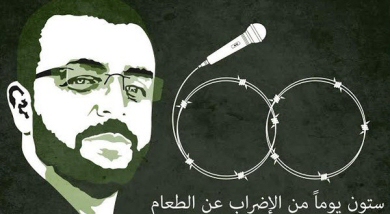Israeli authorities have decided to forcibly treat hunger striking detainee, journalist Muhammad al-Qeeq, without his consent, according to Minister Issa Qaraqe, chairman of the Detainees and Ex-Detainees Commission.Earlier on Wednesday, the Israeli ethics committee at Afula hospital, where Palestinian detainee al-Qeeq is being hospitalized, said that he is on the verge of death, following 71 consecutive days of hunger strike in protest of being imprisoned without a charge or trial.
Iyad Mesk, an attorney with the Palestinian Prisoner’s Society (PPS), said that the Israeli ethics committee, composed of nine physicians, concluded that al-Qeeq’s health has reached a very critical stage and that he faces the possibility of death at any moment, stressing that even if he survives, he still remains at risk of a potential failure of various organs.
The commission said that medical reports issued by Afula hospital are merely pro forma reports, given the fact that al-Qeeq has been rejecting to undergo any medical tests, including blood and Electrocardiogram (ECG) examinations.
The commission also accused the Israeli Supreme Court of being an “accomplice” with the Israeli ‘extreme right-wing government’, in its blatant disregard to al-Qeeq’s health deterioration.
To be noted, the World Medical Association’s declarations on hunger strikers, including the Malta Declaration “forbids applying pressure to end a hunger strike and forced medical treatment.” The Tokyo Declaration ‘forbids physicians’ participation in torture, including the forced feeding or treatment of hunger strikers.”
The World Medical Association, the Red Cross, and the United Nations, consider forced treatment a cruel, inhuman, and degrading treatment or punishment, and a blatant violation of international law and human rights.
According to the prisoner rights group, Addameer, “Both force-feeding and forced treatment are violent policies that are very painful and absolutely violate the principle of individual autonomy.”
“The practices constitute degrading, inhumane treatment, that could amount to torture. Both practices may be dangerous and have a negative impact on Palestinian hunger strikers, and each presents an unsuitable approach to save their lives.”
To be noted, on January 27th, 2016, the Israeli Supreme Court fixed al-Qeeq’s administrative detention term, without charge or trial, for six months, despite his critical health condition.
In a statement issued on Tuesday, the United Nations Coordinator for Humanitarian Assistance and Development Aid, Robert Piper, expressed grave concern over Israel’s continued practice of administrative detention, without charge or trial.
“I am alarmed by the rapidly deteriorating health of Palestinian administrative detainee, Muhammad Al-Qeeq, who is on hunger strike in protest against the arbitrary nature of his detention and ill-treatment.”
The UN official reiterated ‘the United Nations’ long-standing position that all administrative detainees – Palestinian or Israeli – should be charged or released without delay’.
See: 01/30/16 Al-Qeeq: Hunger Striking Journalist Writes Testament

